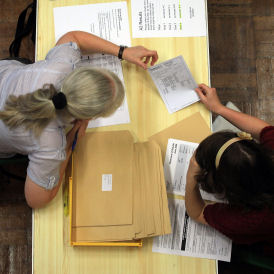A-level results day dawns
As thousands of teenagers prepare to receive their A-level exam results, a Government minister says “traditional” subjects should be valued more highly in the race for university places.

Around 250,000 A-level students will get their exam results later today and find out if they have made the grade for a university place.
The pressure on this year’s students is possibly more intense than ever, as many scramble to begin studying at university before higher tuition fees come into force in 2012.
Those who miss out this year in England could end up with debts of £50,000 when they leave under the new higher education funding system, according to a recent study. For students elsewhere in the UK the system is different.
Universities Minister David Willetts has also added to the mix, suggesting today that more modern subjects such as dance and media studies should not be recognised as core academic subjects.
[It is] unrealistic to think that the country could afford to offer a properly funded university place to everyone who would like one. Wendy Piatt, Russell Group
Mr Willetts told the Daily Telegraph that the points system used in university admissions “sends a very bad message to young people by implying that all A-levels have an equal chance of helping them into university”.
Ucas, which processes university applications, allocates points based on the grade achieved, regardless of the subject.
Mr Willetts added: “[Ucas] are operating a massive system with more than half a million applications, but they need to signal the importance of some A-levels more than others and that message is often hidden behind a tariff point model.”
He also said that work-based apprenticeships should be accepted as a way to get into university.
Read more from Channel 4 News: Universities minister vs sixth form blogger
Higher tuition fees
Concerns have been raised about students who fail to secure a university place and face the daunting prospect of up to three times higher tuition fees in 2012.
Wendy Piatt, of the Russell Group, which represents leading universities, said it was not realistic to expect every student who wants to go to university to get a place.
She said: “The costs to the taxpayer of a very generous system of student loans and grants make it unrealistic to think that the country could afford to offer a properly funded university place to everyone who would like one.
“In a tight fiscal climate, maintaining the quality of the student experience must be a greater priority than expanding the number of places.”
Mary Bousted, general secretary of the Association of Teachers and Lecturers, expressed concern about the financial burden for those who miss out this year.
She said: “This year, more than ever, we fear for the thousands of students who miss out on a university place and face paying three times more next year.”
Read more from Channel 4 News: Can't afford a Gap Year? Think again